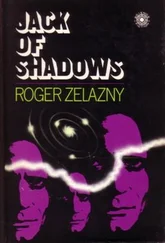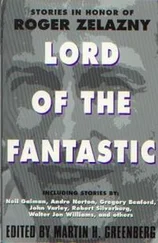Roger Zelazny - My Name is Legion
Здесь есть возможность читать онлайн «Roger Zelazny - My Name is Legion» весь текст электронной книги совершенно бесплатно (целиком полную версию без сокращений). В некоторых случаях можно слушать аудио, скачать через торрент в формате fb2 и присутствует краткое содержание. Жанр: Фантастика и фэнтези, на английском языке. Описание произведения, (предисловие) а так же отзывы посетителей доступны на портале библиотеки ЛибКат.
- Название:My Name is Legion
- Автор:
- Жанр:
- Год:неизвестен
- ISBN:нет данных
- Рейтинг книги:5 / 5. Голосов: 1
-
Избранное:Добавить в избранное
- Отзывы:
-
Ваша оценка:
- 100
- 1
- 2
- 3
- 4
- 5
My Name is Legion: краткое содержание, описание и аннотация
Предлагаем к чтению аннотацию, описание, краткое содержание или предисловие (зависит от того, что написал сам автор книги «My Name is Legion»). Если вы не нашли необходимую информацию о книге — напишите в комментариях, мы постараемся отыскать её.
My Name is Legion — читать онлайн бесплатно полную книгу (весь текст) целиком
Ниже представлен текст книги, разбитый по страницам. Система сохранения места последней прочитанной страницы, позволяет с удобством читать онлайн бесплатно книгу «My Name is Legion», без необходимости каждый раз заново искать на чём Вы остановились. Поставьте закладку, и сможете в любой момент перейти на страницу, на которой закончили чтение.
Интервал:
Закладка:
I have done a lot of thinking as I watched them, she said, attempting to analyze their character in terms of their behavior, their physiology. Are you familiar with the writings of Johan Huizinga?
Faintly, I said. It has been years since I read Homo Ludens, and it struck me as a rough draft for something he never got to work out completely. But I recall his basic premise as being that culture begins as a sort of sublimation of a play instinct, elements of sacred performances and festal contests continuing for a time in the evolving institutions, perhaps always remaining present at some level, although his analysis stopped short of modem times.
Yes, she said. The play instinct. Watching them sport about, it has often seemed to me that as well adapted as they are to their environment, there was never a need for dolphins to evolve complex social institutions, so that whatever it was they did possess along those lines was much closer to the earlier situations considered by Huizinga, a life condition filled with an overt indulgence in their version of festal performances and contests.
A play-religion?
Not quite that simple, though I think that is part of the picture. The problem here lies in language. Huizinga employed the Latin word ludus for a reason. Unlike the Greek language, which had a variety of words for idling, for competing in contests, for passing the time in different fashions, Latin reflected the basic unity of all these things and summarized them into a single concept by means of the word ludus. The dolphins' distinctions between play and seriousness are obviously different from our own, just as ours are different from the Greeks'. In our understanding of the meaning of ludus, however, in our ability to realize that we may unify instances of activity from across a broad spectrum of behavior patterns by considering them as a form of play, we have a better basis for conjecture as well as interpretation.
And in this manner you have deduced their religion?
I haven't, of course. I only have a few conjectures. You say you have none?
Well, if I had to guess, just to pull something out of the ah , I would say some form of pantheism, perhaps something akin to the less contemplative forms of Buddhism.
Why 'less contemplative'? she asked.
All that activity, I said. They don't even really sleep, do they? They have to get topside quite regularly in order to breathe. So they are always moving about. When would they be able to drift beneath the coral equivalent of a bo tree for any period of time?
What do you think your mind would be like if you never slept?
I find that rather difficult to conceive. But I imagine I would find it quite distressing after a while, unless ...
Unless what?
Unless I indulged in periodic daydreaming, I suppose.
I think that might be the case with dolphins, although with a brain capacity such as they possess I do not feel it need necessarily be a periodic thing.
I don't quite follow you.
I mean they are sufficiently endowed to do it simultaneously with other thinking, rather than serially.
You mean always dreaming a little? Taking their mental vacations, their reveries, sidewise in time as it were?
Yes. We do it too, to a limited extent. There is always a little background thinking, a little mental noise going on while we are dealing with whatever thoughts are most pressing in our consciousness. We learn to suppress it, calling this concentration. It is, in one sense, a process of keeping ourselves from dreaming.
And you see the dolphin as dreaming and carrying on his normal mental business at the same time?
In a way, yes. But I also see the dreaming itself as a somewhat different process.
In what way?
Our dreams are largely visual in nature, for our waking lives are primarily visually oriented. The dolphin, on the other hand ...
... is acoustically oriented. Yes. Granting this constant dreaming effect and predicating it on the neurophysiological structures they possess, it would seem that they might splash around enjoying their own sound tracks.
More or less, yes. And might not this behavior come under the heading of ludus?
I just don't know.
One form of ludus, which me Greeks of course saw as a separate activity, giving it the name diagoge, is best translated as mental recreation. Music was placed in this category, and Aristotle speculated in his Politics as to the profit to be derived from it, finally conceding that music might conduce to virtue by making the body fit, promoting a certain ethos, and enabling us to enjoy things in me proper way, whatever that means. But considering an acoustical daydream in this light, as a musical variety of ludus, I wonder if it might not indeed promote a certain ethos and foster a particular way of enjoying things?
Possibly, if they were shared experiences.
We still have no proper idea as to the meanings of many of their sounds. Supposing they are vocalizing some part of this experience?
Perhaps, given your other premises.
Then that is all I have, she said. I choose to see a religious significance in spontaneous expressions of diagoge. You may not.
I don't. I'd buy it as a physiological or psychological necessity, even see it, as you suggested, as a form of play, or ludus. But I have no way of knowing whether such musical activity is truly a religious expression, so for me the ball stops rolling right there. At this point, we do not really understand their ethos or their particular ways of viewing life. A concept as alien and sophisticated as the one you have outlined would be well-nigh impossible for them to communicate to us, even if the language barrier were a lot thinner than it is now. Short of actually finding a way of getting inside them to know it for oneself, I do not see how we can deduce religious sentiments here, even if every one of your other conjectures is correct.
You are, of course, right, she said. The conclusion is not scientific if it cannot be demonstrated. I cannot demonstrate it, for it is only a feeling, an inference, an intuition, and I offer it only in that spirit. But watch them at their play sometime, listen to the sounds your ears will accept. Think about it. Try to feel it.
I continued to stare at the water and the sky. I had already learned everything I had come to find out and the rest was just frosting, but I did not have the pleasure of such desserts every day. I realized then that I liked the girl even more than I had thought I would, that I had grown quite fascinated as she had spoken, and not entirely because of the subject. So, partly to prolong things and partly because I was genuinely curious, I said, Go ahead. Tell me the rest. Please.
The rest?
You see a religion or something on that order. Tell me what you think it must be like.
She hesitated. Then, I don't know, she said. The more one compounds conjectures the sillier one becomes. Let us leave it at that
But that would leave me with little to say but Thank you and Good night. So I pushed my mind around inside the parameters she had laid down, and one of the things that came to me was Barthelme's mention of the normal distribution curve with reference to dolphins.
If, as you suggest, I began, they constantly express and interpret themselves and their universe by a kind of subliminal dreamsong, it would seem to follow that, as in all things, some are better at it than others. How many Mozarts can there be, even in a race of musicians? Champions, in a nation of athletes? If they all play at a religious diagoge, it must follow that some are superior players. Would they be priests or prophets? Bards? Holy singers? Would the areas in which they dwell be shrines, holy places? A dolphin Vatican or Mecca? A Lourdes?
She laughed.
Now you are getting carried away, Mister, Madison.
Читать дальшеИнтервал:
Закладка:
Похожие книги на «My Name is Legion»
Представляем Вашему вниманию похожие книги на «My Name is Legion» списком для выбора. Мы отобрали схожую по названию и смыслу литературу в надежде предоставить читателям больше вариантов отыскать новые, интересные, ещё непрочитанные произведения.
Обсуждение, отзывы о книге «My Name is Legion» и просто собственные мнения читателей. Оставьте ваши комментарии, напишите, что Вы думаете о произведении, его смысле или главных героях. Укажите что конкретно понравилось, а что нет, и почему Вы так считаете.






